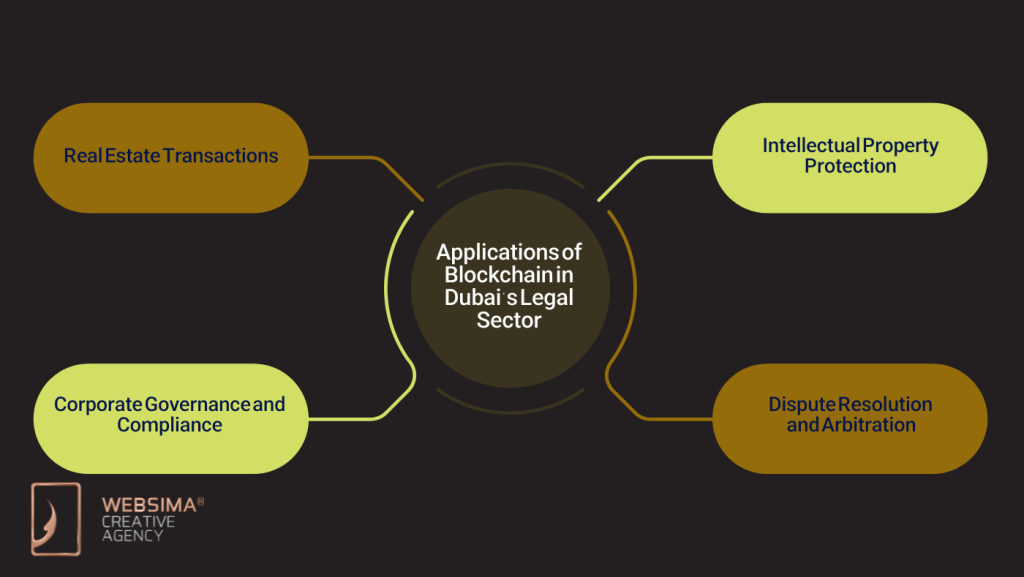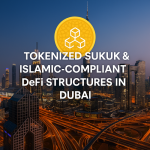Dubai has rapidly established itself as a global leader in embracing innovation, and the Dubai legal sector is no exception. The city continues to pioneer technological advancements. Hence, blockchain in Dubai is about to play a transformative role in the legal services. By leveraging the decentralized, transparent, and secure nature of blockchain technology, Dubai is aiming to revolutionize legal practices. From smart contracts to automated legal services, the future of blockchain in Dubai’s legal sector looks incredibly promising, with significant potential for innovation and disruption.
The pilot with @Cardano_CF and Dubai Police is an excellent use-case for blockchain. #Cardano
A very interesting thought that was mentioned at today’s discussion –
“How will entities handle blockchain solutions without having any exposure to the underlying cryptocurrency”… pic.twitter.com/34vpAnt4Vw— K₳izen Crypto (@KaizenCrypto) September 24, 2024
The blockchain in legal sector applications is expanding beyond traditional uses. It is offering new solutions to common challenges such as contract management, dispute resolution, document verification, and intellectual property protection. In this article, we explore how blockchain is shaping the future of Dubai’s legal services, the key benefits of blockchain adoption, and the steps toward a fully digitized and automated legal landscape.
Understanding Blockchain and Its Role in Dubai’s Legal Sector
Blockchain is a digital ledger technology that records transactions across a distributed network. Each transaction or piece of data is securely encrypted and linked to previous records, making the data immutable and transparent. This decentralized architecture ensures that no single entity has control over the entire system. That would significantly increase trust and reduce the likelihood of fraud.
In the Dubai legal sector, blockchain offers immense potential for enhancing legal operations. Blockchain’s ability to automate processes, eliminate intermediaries, and provide an immutable record of transactions makes it particularly suited for legal applications such as contract execution, evidence management, and dispute resolution.
NEW: The Dubai International Financial Centre enacts a new Digital Assets Law, updating its legal framework to recognize #Bitcoin and cryptocurrencies.
The law impacts contracts, insolvency, damages, obligations, securities, and personal property. pic.twitter.com/srlLuJrfJU
— Bitcoin News (@BitcoinNewsCom) March 18, 2024
The Dubai government has already demonstrated its commitment to incorporating blockchain in various sectors. In particular, with the Dubai Blockchain Strategy aiming to make the city paperless by 2025. In the Dubai legal sector, blockchain’s goal is to disrupt traditional legal workflows by introducing smart contracts, automated document management, and secure digital identity systems.
Key Benefits of Blockchain for the Legal Sector
The blockchain in Dubai’s legal sector offers several key benefits. Those benefits will redefine how legal services are provided, improving efficiency, reducing costs, and enhancing trust. These benefits include:

1. Smart Contracts: Automated and Self-Executing Agreements
One of the most exciting applications of blockchain in the Dubai legal sector is the use of smart contracts. A smart contract is a self-executing contract with terms directly written into code. After meeting the predefined conditions, the contract automatically executes without the need for intermediaries such as lawyers, notaries, or banks.
For example, in real estate transactions, a smart contract can automate the process of transferring ownership once the buyer has made the payment and met all other conditions. This drastically reduces the time, cost, and complexity of legal processes, while ensuring greater transparency and reducing the chances of fraud.
Dubai’s legal sector is already exploring smart contract applications in various areas, including real estate, finance, and corporate law. By automating contract execution, blockchain in legal sector applications will ensure faster and more efficient transactions, benefiting businesses, government entities, and individuals alike.
2. Enhanced Security and Data Integrity
Legal documents and contracts often contain sensitive information that must be securely stored and transmitted. Blockchain’s encryption and immutability provide a high level of security, ensuring that documents cannot be altered or tampered with after they are recorded. This can be especially crucial for legal transactions, where accuracy and integrity are paramount.
In Dubai’s legal sector, blockchain technology will ensure that legal documents, such as contracts, deeds, and intellectual property rights, are securely stored and easily accessible by authorized parties. This eliminates the risk of document forgery or fraud. Such a secure decentralized storing ledger ensure that all parties involved can trust the authenticity of the data.
3. Cost Reduction through Automation
The criticism about legal industry is is often about being expensive, particularly in traditional contract management and dispute resolution processes, which typically involve numerous intermediaries. Blockchain in Dubai will streamline these processes by eliminating intermediaries and automating repetitive tasks. Smart contracts and blockchain-based document management systems will reduce administrative costs, making legal services more affordable for businesses and individuals.
For example, in Dubai’s legal sector, blockchain technology can be used to automate routine legal tasks, such as contract drafting, compliance verification, and even certain dispute resolution mechanisms. These automated systems will reduce the need for manual labor, enabling legal professionals to focus on more complex, value-added work.
4. Transparency and Accountability
Blockchain’s transparent nature allows for real-time tracking of transactions and legal agreements, providing an auditable trail for every step of the process. In the Dubai legal sector, this transparency can be particularly beneficial for contracts, litigation, and regulatory compliance. With blockchain, all parties involved in a legal agreement can access the same version of the contract or document, reducing the chances of misunderstandings or disputes.
For example, blockchain could is usable to track the performance of parties involved in a contract, such as in construction or supply chain agreements, ensuring that all obligations are met before the contract is executed. This level of transparency helps foster trust and accountability among businesses and legal professionals.
Applications of Blockchain in Dubai’s Legal Sector
Dubai’s legal sector is already adopting blockchain technology in several key areas. Here are some of the most promising applications of blockchain in Dubai’s legal services:

1. Real Estate Transactions
Dubai’s real estate market is one of the most dynamic in the world. The blockchain in Dubai’s legal sector is already playing a role in transforming the property transactions process. Smart contracts can automate the transfer of property ownership once the payment and other conditions are met. Blockchain also provides an immutable ledger for recording property transactions, which helps prevent fraud and disputes over ownership. Hence, blockchain’s role in attracting foreign investment into Dubai real estate market will be significant
Dubai’s Land Department has already initiated blockchain-based systems to facilitate more efficient property transactions, reducing the time and cost involved in traditional methods.
2. Intellectual Property Protection
The blockchain in the legal sector can also help safeguard intellectual property (IP). That would be through providing a secure and transparent way to track ownership, usage, and licensing of creative works. Through blockchain-based registries, artists, inventors, and businesses can register their IP rights, ensuring of securely store of their creations and protection against infringement.
Dubai’s innovation-driven environment makes it an ideal location for applying blockchain technology in IP protection. As the city continues to position itself as a hub for tech startups and creative industries, blockchain can offer greater security and efficiency for IP management and enforcement.
3. Corporate Governance and Compliance
In the corporate world, blockchain in Dubai’s legal sector can help streamline compliance with regulatory requirements. By automating compliance checks and providing a transparent, auditable trail of actions, blockchain can help businesses ensure that they meet legal standards and avoid penalties.
Blockchain technology can also be used to create decentralized, transparent voting systems for shareholder meetings or board elections, ensuring that corporate governance is conducted in an open and accountable manner.
4. Dispute Resolution and Arbitration
The use of blockchain in Dubai’s legal sector can also enhance dispute resolution processes. By recording every step of a dispute or arbitration process on a blockchain, all parties involved can access the same immutable evidence, reducing the chances of manipulation or misinterpretation of data.
Moreover, blockchain-based systems can facilitate automated arbitration, where predefined conditions in a contract automatically trigger the dispute resolution process. This can significantly reduce the time and cost associated with resolving disputes, providing a quicker and more efficient alternative to traditional litigation.
Challenges and the Road Ahead
Blockchain holds immense potential for Dubai’s legal sector. However, there are several challenges that must talk about, before realizing its full potential. These challenges include Dubai legal recognition on smart contracts, the need for legal professionals to embrace new technologies, and the development of infrastructure to support blockchain-based systems.
Dubai’s government is already taking steps to address these issues. For example, the Dubai Legal Affairs Department is working on blockchain regulations to ensure that smart contracts and other blockchain-based legal tools are compliant with existing laws. The city’s legal professionals are also undergoing training to better understand blockchain technology and its implications for the legal industry.
Conclusion: A Bright Future for Blockchain in Dubai’s Legal Sector
The future of blockchain in Dubai’s legal sector is bright, with smart contracts, automated legal services, and secure document management transforming the way legal professionals work and interact with clients. As blockchain technology continues to evolve, it will play an increasingly central role in reducing costs, enhancing transparency, and improving the efficiency of legal services in Dubai.
The Dubai legal sector will continue to innovate, setting a global example for how technology can reshape the future of law.
Websima, as the leading blockchain service provider in Dubai, is more than happy to help, if you are planning to start a blockchain-based business in Dubai. Blockchain, crypto and web3 web and website development, smart contract programming and development, Blockchain, Web3 and crypto company establishment are just a few out of many services that we provide. Feel free to contact us to book for a free consultation meeting with our talented team





